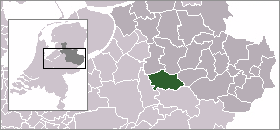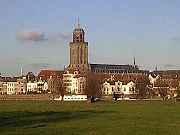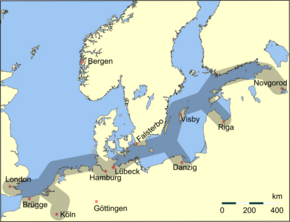Deventer
| Deventer | |
 |
|
| Country | Netherlands |
|---|---|
| Province | Overijssel |
| Area (2006) | |
| - Total | 134.37 km² (51.9 sq mi) |
| - Land | 131.31 km² (50.7 sq mi) |
| - Water | 3.07 km² (1.2 sq mi) |
| Population (1 January, 2007) | |
| - Total | 96,596 |
| - Density | 736/km² (1,906.2/sq mi) |
| Source: CBS, Statline. | |
| Time zone | CET (UTC+1) |
| - Summer (DST) | CEST (UTC+2) |
![]() Deventer is a municipality and city in the Salland region of the Dutch province of Overijssel. Deventer is largely situated on the east bank of the river IJssel, but also has a small part of its territory on the west bank. In 2005 the municipality of Bathmen (pop. 5,000) was merged with Deventer as part of a national effort to reduce bureaucracy in the country.
Deventer is a municipality and city in the Salland region of the Dutch province of Overijssel. Deventer is largely situated on the east bank of the river IJssel, but also has a small part of its territory on the west bank. In 2005 the municipality of Bathmen (pop. 5,000) was merged with Deventer as part of a national effort to reduce bureaucracy in the country.
Contents |
Population centres
Associated hamlets at second level
- Deventer (see below)
- Snippeling (a small community about 2 km east of the city centre)
- Colmschate (Deventer suburb quarters surrounding eponymous village 4 km east of the city centre, ice skating hall, small railway station)
- De Bannink
- Oxe
- Diepenveen, a picturesque village 4 km to the north, surrounded by forests
- Molenbelt
- Rande
- Tjoene
- Lettele, in a forest area
- Linde
- Oude Molen ('old mill')
- Okkenbroek
- Schalkhaar (former centre of Diepenveen municipality including Lettele and Okkenbroek until 1/1/1999)
- Averlo
- Frieswijk
- Bathmen (independent municipality until 1/1/2005)
- Apenhuizen ('monkey houses')
- Dortherhoek
- Loo
- Pieriksmars
- Zuidloo
Deventer (city)
Deventer was probably founded by the English missionary Lebuinus around 768, who built a wooden church on the right bank of the river IJssel. This was not the first human settlement at the location; from the Bronze Age to about 400 A.D., there was a settlement at Colmschate, 4 km east of the city centre. Remains of this settlement were excavated between 1981 and 2006.
Sights and events
- The Waag (Weighing-house) on the edge of the Brink square, built in 1550 and restored in 2003. The Deventer City Museum is housed inside the Waag. The Museum's collections include industrial and trading history, paintings by Gerard Terborch and Han van Meegeren, silver objects, and prehistoric findings). Thea Beckman's novel Het wonder van Frieswijck ("The Frieswijck Miracle") features the Waag. On the outer wall of the Waag hangs a kettle that is over 500 years old, said to have been used for a public execution in the late Middle Ages; a man who had produced counterfeit coins was cooked to death in it.
- The Lebuïnuskerk (St. Lebuin's Church) in Gothic style, with remarkable ceiling paintings and a beautiful organ. Its tower can be climbed in summer.
- The Brink (market square) with houses, shops, and cafes dating from 1575-1900. The market square is also the center of Deventer nightlife. Alongside this square there is the Bussink "Koekhuisje", where you can buy the famous Deventer Koek (honey-cake). Markets take place every Friday (including a very big one on Good Friday, following a medieval tradition) and Saturday.
- The Speelgoedmuseum (Toy Museum) behind the Waag, housed in one of the most picturesque old houses of the city.
- The medieval Bergkerk (Mountain Church), on top of a small hill (old river dune), now a museum for modern art.
- The picturesque and old streets around the Bergkerk, known as Bergkwartier (Mountain Quarter) situated on and around an old river dune.
- Football stadium De Adelaarshorst, home venue of Go Ahead Eagles situated in a typical 1930s neighbourhood and one of the oldest stadiums still in use today.
- The city hosts three events of national and even international fame:
- In the first week-end of July, the city centre is the scene of the spectacular open air festival "Deventer op stelten" (Deventer on Stilts). Actors and artists give free performances in the streets and on the Brink square. All actors must use stilts during their acts.
- In August, Deventer is home to Europe's largest book fair, attracting some 125,000 visitors.
- The Dickens Festival in December sees some of the oldest streets and alleys in the city dressed up in the style of the Victorian era, as per Dickens' writings. The latter attracted 135,000 visitors in 2004 and 2006.
History
City Rights and Medieval Times

The village of Deventer, already important because of a trading road crossing the river IJssel, was looted and burnt down by the Vikings in 882. It was immediately rebuilt and fortified with an earthen wall (in the street Stenen Wal remains of this wall have been excavated and restored). Deventer received city rights in 956, after which fortifications were built or replaced by stone walls around the city for defense. Between 1000 and 1500, Deventer grew to be a flourishing trade city because of its harbour on the river IJssel, which was capable of accommodating large ships. The city was a member of the Hanseatic League. In the 15th century, Deventer had a common mint, where coins for the 3 IJssel cities Deventer, Zwolle, and Kampen were made.
Deventer is the place of birth of Geert Groote and home to his Brethren of the Common Life, a school of religious thought that was of great influence on Thomas a Kempis and Erasmus in later times. It had book printing shops dating back to as early as 1477, and an internationally famous Latin School, where the famous scholar Desiderius Erasmus went when he was a boy.
16th–20th century
Between 1500 and 1800, the mass of water flowing through the IJssel decreased, decreasing the importance of Deventer's harbour. The competition of trade centres in Holland, as well as the religious war between 1568 and 1648, brought a decline in the city's economy. In the 18th century, the iron industry came to Deventer. East of the town, so-called "oer", riversand containing iron, was found as early as 900. From this material, ore was produced and brought to town. The main road of the villages Okkenbroek, Lettele and Schalkhaar is still named Oerdijk (Ore Dyke). In the 19th century, Deventer became an industrial town. Bicycles, carpets, tins and cans for food and drinks, cigars, books, machinery, mattress were produced until the mid-20th century.
World War II
Deventer has seen few military engagements throughout its long history, although it was a garrison city of the Dutch cavalry. The industrial area and harbour were bombed heavily during World War II. The city centre has been largely spared, thus offering a view that has remained largely unchanged for the past few centuries.
The female Jewish poet and writer, Etty Hillesum, lived in Deventer during the war before being deported to Auschwitz.
In Schalkhaar, a village only 2 km northeast of the city centre, barracks were used by the German occupying forces to train Nazi policemen. The compound is now a centre for asylum seekers.
Deventer has been somewhat popular with the film industry. During the production of the movie A Bridge Too Far all of the scenes taking place in nearby Arnhem were filmed in Deventer - as Arnhem itself had lost its historic center.
Modern Times

The city's trade and industry is still of some importance. The city is host to a factory producing central heating systems, as well as an editor and publisher named Kluwer. The Deventer honey cake (Deventer Koek), produced in Deventer for over 500 years, is still manufactured locally and sold all over the Netherlands.
Railway
Deventer has 2 railway stations - for destinations see
- Deventer railway station
- Deventer Colmschate railway station
Notable people associated with Deventer
- Jan Bultman
- Ron Dekker
- Erasmus
- Geert Groote
- Alexander Hegius
- Etty Hillesum
- Jomanda
- Bert van Marwijk
- Han van Meegeren
- (Saint) Radboud
- Rutger Jan Schimmelpenninck
- Jan Pieterszoon Sweelinck
- Han Hollander
- Marc Overmars
- Victor Sikora
- Gerard Ter Borch
- Guusje Ter Horst
- Gertjan Verbeek
- Arjen Grolleman
External links
|
||||||||||||||||||||||||||
|
|||||||||||

